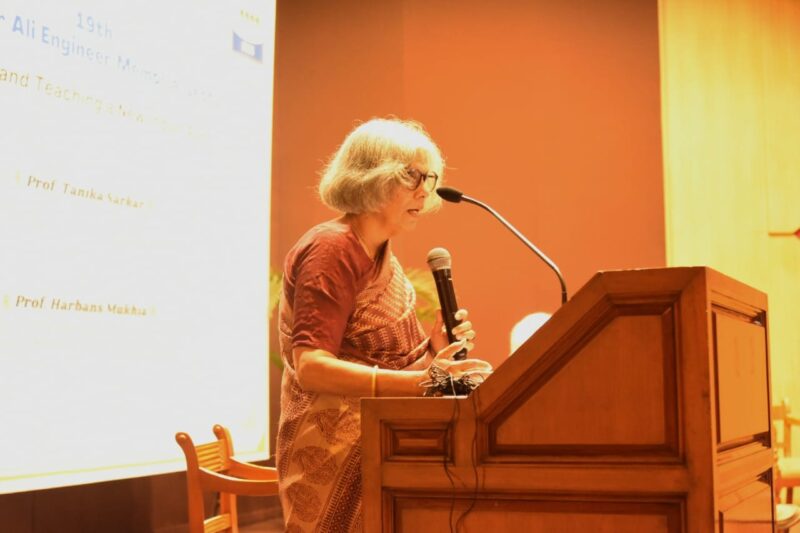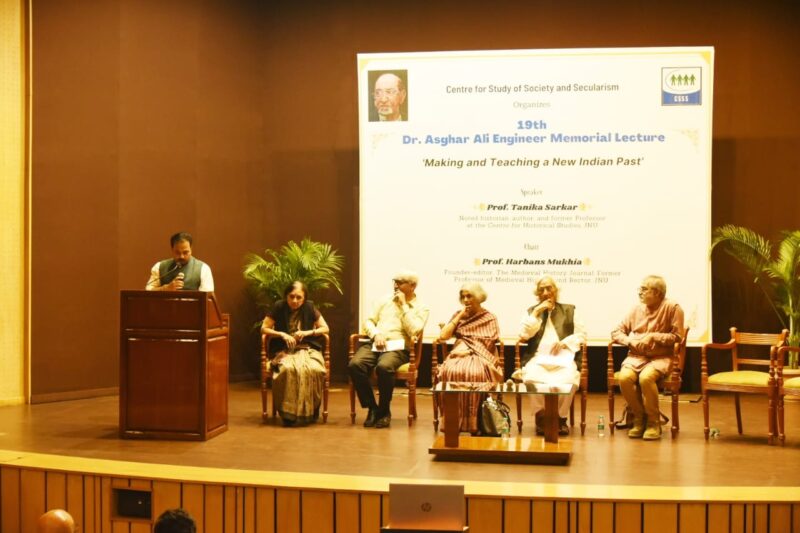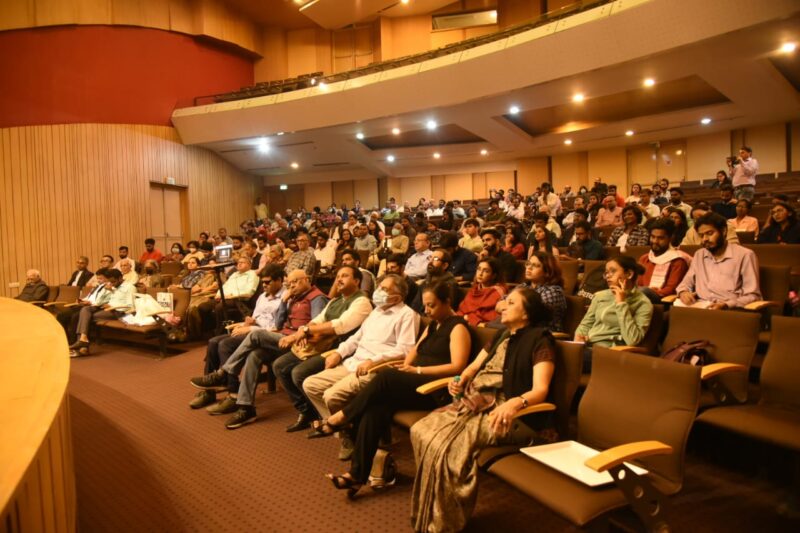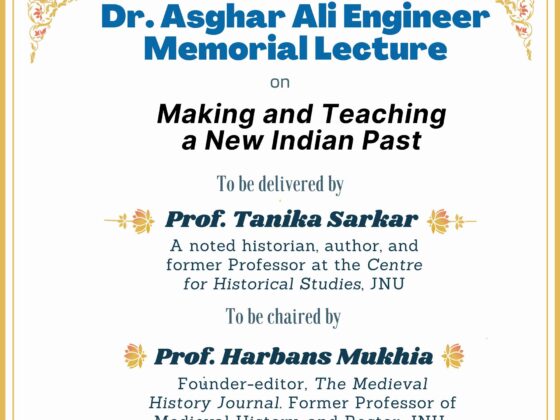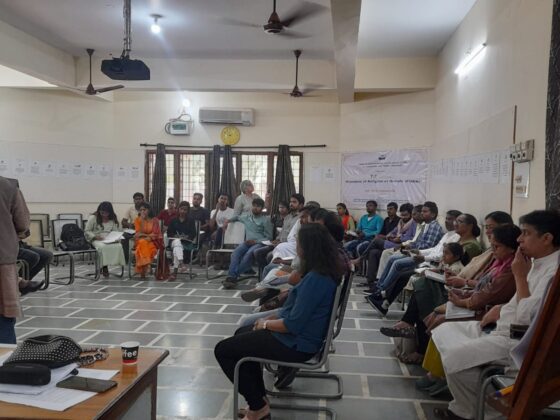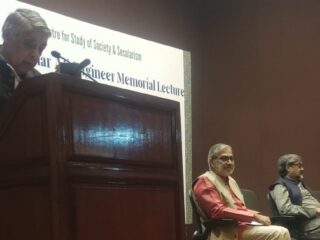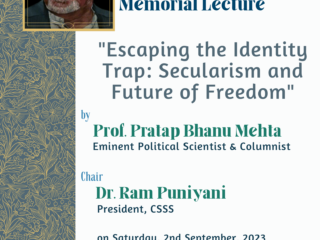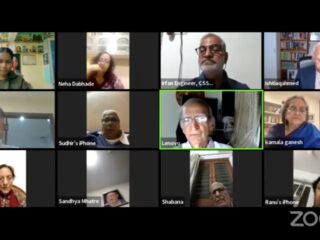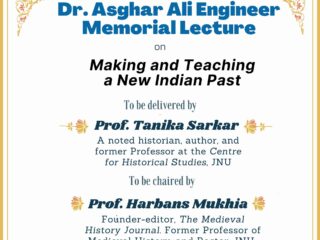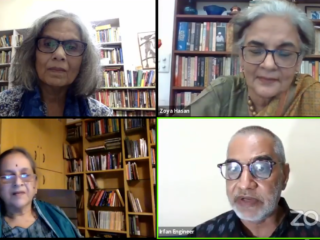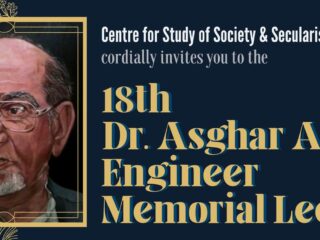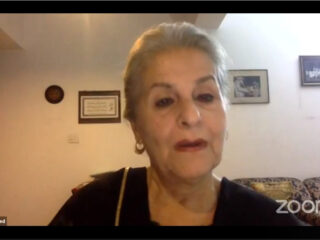Hindu Right and Distortion of History in India
Neha Dabhade
Report of Dr. Asghar Ali Engineer Memorial Lecture
“Muslims in India today are depicted as signifiers of horrible histories- of rape of Hindu women, partition, fanaticism”, pointed out Prof. Tanika Sarkar, reputed historian and celebrated academic, while delivering the 19thDr. Asghar Ali Engineer Memorial Lecture on 31st October, 2022. The lecture titled, ‘Making and Teaching of Indian Past’ was organized by Centre for Study of Society and Secularism and chaired by Prof. Harbans Mukhia, prominent historian and author. Prof. Sarkar through her erudite lecture explored two themes, firstly, the different dominant approaches or frameworks to teaching of history and secondly Hindu nationalist historical project and its prominent premises. This lecture was attended by over 200 participants comprising of eminent scholars, academics, civil society activists and large number of students.
Prof. Sarkar noted that the basic premises of Hindu nationalist teaching of history are twofold- pride in the great Hindu past and stigmatization of Muslims as foreigners and outsiders. She observed that RSS has been the most influential entity to shape and control historical narratives and teaching of history. It has shaped the broad popular understanding of Indian history in the public domain. In order to understand how these narratives are seeped into the popular imagination despite having no basis in historical research, facts and evidences, she illustrates the different sources like educational institutions, curricula of history, syllabi on one hand and other mediums like historical fictions, children’s comics, media depictions and tourist guides have been controlled and influenced by Hindutva ideologues.
Prof Sarkar points out that basis of this distorted historical facts and narratives emanate from the ideology of Hindutva and the thoughts of some of the prominent ideologues. For instance, Prof. Sarkar illustrated, Savarkar in his writings merged faith with geographical origins by making the ideas of ‘Hindu’ and ‘Indian’ synonymous. According to him, Hindu faith was born inside India and this faith constitutes the essential essence of the country. While Savarakar, according to Prof. Sarkar, does problematizes caste division in Hindu society, he brushes it away by claiming that Hindus is one big family since the blood of all castes has mingled over centuries. Following from Savarkar’s thoughts, territorial origin of faith becomes the test for nationalism. Faiths and their followers born outside of Indian territory are looked upon as ‘foreign’ and ‘outsiders’.
Prof. Sarkar addressed in her lecture, one of the most popular myths and narratives that Muslims who came to India had diabolic religious ambition and not just political ambition. That is to destroy Hindu religion and converting Hindus into Islam. Prof. Sarkar however, points out that such narrative fly in the face of historical evidence since there is no evidence to prove that the Muslim rulers converted large number of Hindus. Another falsehood being spread claiming to be historical ‘fact’ is that Muslims considered it as their religious duty to kidnap and force into their religion non-Muslim women in India reflecting their lust for carnage. Savarkar, observes Prof. Sarkar, goes to the extent of blaming Shivaji for not abducting Muslim queens and women. Such narratives have been given contemporary spin in the form of allegations of ‘love jihad’. Muslim men alone are blamed for raping Hindu women during the Partition violence while there was equal number of instances of Muslim women being raped by Hindu men during the Partition. However, rape has become the defining feature of Muslim men alone.
Prof. Sarkar through the above examples explained the adverse impact historical narratives based on distorted facts and history has on the social fabric. These historical narratives throbbing with overpowering emotion and rhetoric and devoid of reason or historical truth wipe out complex histories. Prof. Sarkar lamented that such narratives tend to wipe out lived realities of everyday living and shared histories. Hindutva ideology which interprets and reconstructs history in such exclusive terms also then demands that ‘good peaceful’ Hindus refashion themselves in the image of the imagined enemy. It demands that Hindus too become fanatical and cruel to beat the Muslims at their own game, thereby perpetrating the spiral of violence and hatred.
This hatred and violence was most visible during the partition, for which the Muslims are blamed. However, Prof. Sarkar, traced back the origin of the two nation theory, which is popular attributed to Jinnah. She points out that Golwalkar famously in his writings in late 1930s said, “ To keep up the purity of the Race and its culture, Germany shocked the world by her purging the country of the Semitic races — the Jews.. a good lesson for Hindustan”. When asked what status would the Muslims and Christians and other non-Hindus have in India, Golwalkar retorted that non- Hindus may stay in India, wholly in subordination to the Hindu nation, claiming nothing, deserving nothing, no privileges and not even citizens’ rights. This was much before Jinnah spoke about the partition.
Prof. Sarkar grapples with the question that why inspite of such narratives being devoid of historical evidence have entered popular historical imagination and gained credulity amongst large swaths of people. Prof. Sarkar attributes this to the relentless work of RSS to propagate such narratives and its success in training its cadre in teaching history. Prof. Sarkar points out that RSS has a well thought out strategy for dissemination of history. Prof. Sarkar observes that RSS has 38 mass fronts and one of them dedicated completely to history. Hindutva ideologues and RSS have worked relentlessly on the sources of popular history including comics and media. These sources were largely neglected by serious historians and other ideologies.
Prof. Sarkar illustrated how RSS placed great value in training its cadres for teaching history. While the Sangh- RSS and its affiliates train its cadre on daily basis in its Shakhas, Golwalkar asked even homebound mothers and wives to transmit these lessons to their Dalit neighbours. This also indicates how the Hindutva organizations have expanded their outreach to different sections of the society. The cadre of the Sangh is highly motivated and ready to work far away from their homes in discomfort to train and transmit historical narratives in communities and people. Electoral victories alone don’t account for the success of RSS and affiliates in influencing and shaping historical narratives or even corporate or NRI support. But this success is on account of rigorous dissemination of history through its various mass fronts like Vanvasi Kalyan Ashram, Sanskar Kendra etc.
Prof. Sarkar also critiqued the other political parties for never sparing a thought to history and its dissemination. She illustrated this point by discussing the case of West Bengal. Though West Bengal was ruled by the left for over three decades continuously, little or no attention was paid to the teaching of history. Prof. Sarkar observed that either the textbooks made for dull reading or had the same stereotypes against Muslims. The Bengal intelligentsia were never involved as a resource and the NCERT textbooks not referred to while teaching. Similarly though the left parties at one point of time had solid mass base and sizeable cadre, they didn’t develop permanent cadre base equipped with pedagogical mission or develop any educational institutions like the RSS and the right. No educational alternatives were proposed and developed.
In contrast, the RSS took the approach of ‘man-making’ precedes ‘nation-making’ and laid emphasis on history and education in a systematic way, pointed out Prof. Sarkar. One of outcomes was the proliferations of educational institutions like the Saraswati Shishu Mandirs, colleges and universities under different names but with the same ideology. Though secular institutions exist, they have a limited reach amongst the middle class and upper middle class. However, the institutions established and run by the right have reached out to even marginalized sections of the society including adivasis and dalits. The Akhil Bhartiya Itihas Sankalan Yojana for instance which is established in Kullu has researched into local adivasi folklore and histories depict them having affinities to the historical narratives of the right. Prof. Sarkar elaborated that in addition to such strategies; the right also provides different kind of aid, medical help, etc to mobilize the vulnerable sections. While the left and other parties may have focused on the survival problems of the people through trade unions, they left out the discourse on historical, cultural and social values, something that the right successfully managed.
Prof. Harbans Mukhia, chair for the lecture in his remarks observed how history is used by political parties for political agenda. He problematized the periodization of history into the ‘neat’ categories of ancient, medieval and modern. He discussed how these periods have come to be identified with religious identity of the dominant rulers- ancient with Hindu kings, medieval with Muslim kings and modern with English rule. Prof. Mukhia further problematized how medieval history of India associated with Muslim rule has become synonymous to dark ages or decline of Indian civilization from its glorious past thereby stigmatizing Muslims.
The lecture was well appreciated. Many students asked questions to the speaker and chair. In the past, Dr. Asghar Ali Engineer memorial lecture was delivered by prominent scholars including Romila Thapar, Prabhat Patnaik, Christophe Jaffrelot, Rajeev Bhargava and Zoya Hasan.
Watch the Lecture
https://www.youtube.com/watch?v=YQUg6AnjeGc

